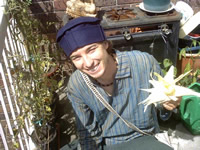|
Where did you grow up and go to school?
I moved around a lot when I was younger, I went to some 10 different schools! But when I think of where I grew up though I think of country N.S.W. It was there that I first discovered my interest in mathematics. My Grade 4 teacher was 'maths mad' and he found a willing student in me. In following years my interest grew and upon discovering science in high school together these two subjects became my favourites. Along side these interests I pursued long distance running and guitar playing most passionately. I had moved to Tasmania by late high school and for my TCE, where I chose the more advanced maths and science and rock music studies. I had no idea that I would go on to further scientific studies and in fact I rather fancied myself a rock star!
 What did you do after school? What did you do after school?
By the end of my schooling I was rather unsure of my direction. I decided to travel abroad where I worked at various jobs and discovered an interest in foreign language. I spent almost a year in France and returned to Australia with a second language. I enrolled in a computer science degree at uni, but still not convinced of my direction it was two years later, including another year abroad this time in Italy, before I decided that maths and physics were the subjects for me! I majored in both these areas to attain my science degree and I am currently taking honours in theoretical physics.
How does an emerging rock star become a physicist?
I guess it comes down to a love of patterns and problem solving. In physics we specialise in just this. Performing experiments gives us interesting results and theoretical physicists then set themselves the challenge of trying to find patterns in these results. It involves mathematical and logical skills as well as creative thinking. It can be extremely satisfying. The results we find often challenge assumptions we have made about the world and cause us to ask new questions about how things just might work.
For example who would think that apples falling to ground and planets orbiting the sun would have anything in common? Or did you know that a clock moving really quickly ticks slower? Time actually slows down when you move at high speeds! And one object can be in several places at the same time, it happens all the time but how is that possible? These results and many others come from the study of physics.
What does your current research involve?
I look at the world of the very, very small. Much smaller than we can even see with the most powerful microscopes. This area of physics is called 'quantum mechanics' and in this world the rules are a quite strange. It is here that one thing may be in several places at once and there are some places that things are just not able to go, even though there is nothing there to stop them. I study these strange effects and use mathematical models to predict just where things are and aren't able to go. In fact it is these rules that describe what how light travels and why things are the colour that they are. Although the ideas seem very abstract the results are very practical. Much of our technology, including computers, depends on the laws of quantum mechanics.
What do you love about physics?
Whilst there are many practical applications for physics my primary motivation is the enjoyment. I do it for fun! I love discovering ways to explain different phenomena and what I found out often surprises me. The best thing is you don't need very much to be a theoretical physicist. A good sharp pencil and paper and off you go. It can be done just a well here in Tasmania as anywhere else in the world you find paper and pencil. As well as a scientist I am a performing musician and more recently a father to a beautiful girl, Althea. In the future I would like to both teach physics and pursue research into new areas.
|
